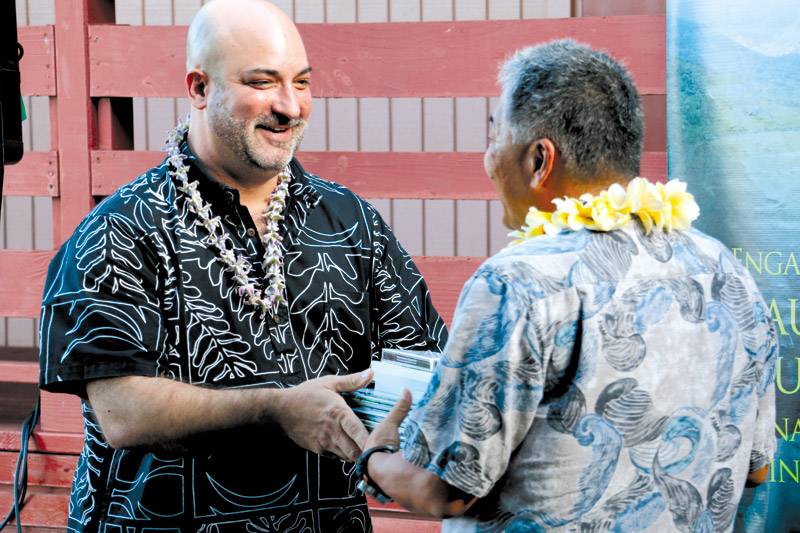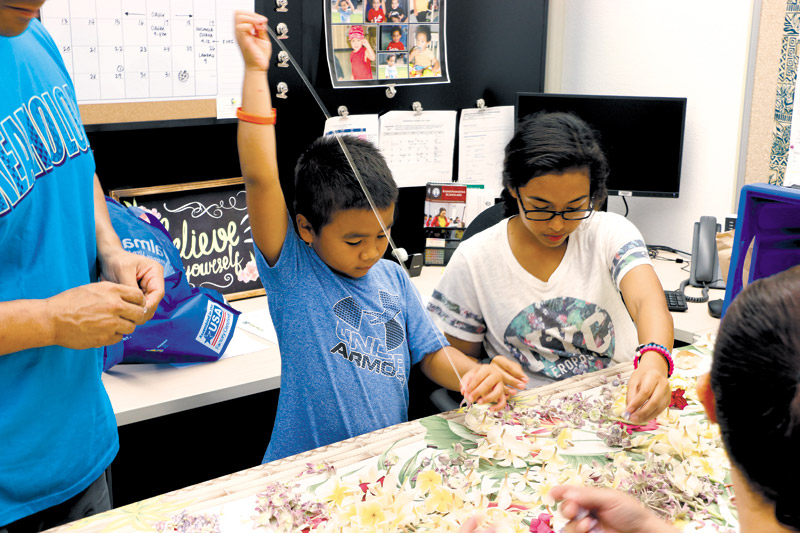Changing Lives Through Education

(From left) Mike Chandler, Erin Cobb-Adams, Moanikeala Furuta, Sharalyn Bucasas, Lei‘ilima Rapozo, Coty “Buffy” Ofisa and Rebecca Cuyo of Kamehameha Schools’ Kaua‘i and Ni‘ihau regional team work out of the school’s new Lı-hu‘e-based Community Hale. MATT FEESER PHOTO
Kamehameha Schools Kapālama’s football team is coming off a riveting win against Punahou, but for alumna and staffer Coty “Buffy” Ofisa, there are so many other positive aspects to proudly share about the educational institute that shaped her life, as well as the lives of many others who are of Native Hawaiian descent. What made her even more proud was to be able to share those things in Kamehameha Schools’ new Community Hale for Kaua‘i and Ni‘ihau.
“This little hale, as humble as it is, this is roots for Kamehameha,” says the regional director for the Kaua‘i and Ni‘ihau Community Hale.
The new site in Līhu‘e combines Kamehameha Schools’ former resource center, which operated on Haleko Road for more than two decades, as well as an office where community programs used to operate behind Pizza Hut. Now, these facilities have consolidated into one central hub that includes a four-person regional team, two ‘ohana engagement team members and three counselors — two dedicated to the Kamehameha Scholars program, and one focused on post-high school efforts.
While the hale might not be a full-fledged campus, it’s a step forward in expanding the school’s efforts and presence on Kaua‘i. The community center is not only for potential and current Kamehameha Schools students and their families; it’s also about forming partnerships with other organizations in order to offer alternative on-island educational opportunities to keiki.

Kekaha Elementary School is getting an academic boost thanks to Kamehameha Schools’ local Community Hale, which is donating hundreds of books to the island school. Presenting a portion of the gift is Ron Cox, director of Kamehameha Publishing.
One such collaboration involves Hui Ho‘omalu Partners in Development Foundation, which assists keiki of Native Hawaiian descent, who are currently in foster care or have recently been placed with adoptive parents. Through the partnerships, children can participate in academic and cultural activities at the hale.
Kamehameha Schools also allies with several other local programs and organizations, including Kawaikini New Century Public Charter School and Tūtū and Me Traveling Preschool, to help keiki achieve the best educational opportunities possible.
“Every time we bring people here, even if it’s just for a meeting, they get to know our hale a little bit better,” says Ofisa. “It’s like inviting a guest into your home. Once they come, and you make them feel comfortable, guess what? They feel comfortable coming back and they spread the word to other people. That’s how we’ll reach our families.”
Kamehameha Schools was founded in the late 1800s by Princess Bernice Pauahi Bishop, whose lineage dates back to King Kamehameha I. She wanted to focus on helping native Hawaiians, or her lāhui (tribe).
“Education was her medium where she thought she could support her people,” adds Ofisa.
Some 130 years later, Ofisa says it’s still a struggle to provide adequate education to all native people, who must prove they are of Hawaiian descent to be admitted to Kamehameha Schools. The population of Native Hawaiian students is estimated to grow from about 16,000 in 2015 on Kaua‘i and Ni‘ihau to about 26,000 by 2040.
On Kaua‘i, about 120 students attend the institute’s preschools, which are located in Kamakani and Anahola. And approximately 180 Kaua‘i students, who are in seventh to 12th grade, attend Kamehameha Schools’ 600-acre Kapālama campus on O‘ahu. The trouble is, there are many more children of Hawaiian descent on Kaua‘i, says Ofisa.
Which is why the Community Hale is vital to the island, as it provides additional learning tools and experiences like literacy support, including a recent donation of 600 books to Kekaha Elementary School’s library and classrooms.
“We are trying to touch more lives,” says Ofisa. “Kamehameha is here, we just look a lot different.”
Ofisa, who is a Kaua‘i native, is grateful she was able to attend Kamehameha Schools on O‘ahu.
“It was a life-changer. So much of who I’ve become has stemmed from those six years going to Kamehameha and learning to live independently,” say Ofisa.
Her belief in the school is so great that her three children — Sami, Kade and Tai — currently attend the boarding school.
The education, which focuses on post-secondary success, building leaders with solid careers, and perpetuating Hawaiian and Christian values, prepped Ofisa for life. Though, she adds, it was the boarding experience that truly taught her to be resilient and strong.
After graduating, she went on to major in communications at University of Portland. Though she was determined to get back to the Garden Isle, she moved to Hilo, where a friend inspired her to work with children. She went back to school to achieve a master’s degree in counseling psychology with an emphasis in school counseling at Chaminade University of Honolulu. At the same time, Chiefess Kamakahelei Middle School was opening, and she was able to return to her beloved island and work there as a school counselor while earning her degree.
A short while later, on a whim, she happened to visit Kamehameha Schools’ web-site to look for employment and discovered they were seeking dorm advisors for their Kapālama campus. She landed the job and served as what she calls a “parent away from home,” helping the girls grow and stay safe. But her heart remained on Kaua‘i and after seven years, when the management position for the former Kamehameha Schools resource center opened up in 2011, she nabbed it. Now, she can’t believe how lucky she is to live on Kaua‘i, work at Kamehameha Schools with keiki and bolster their education.
“It’s not a path I could even expect to happen. I never thought I’d be sitting here introducing our new hale,” she says.
Ofisa encourages all families with keiki of Native Hawaiian descent to stop by the new digs. Plenty of information can be found online, but Kyle Galdeira, Kamehameha Schools communications specialist, says it’s “nice to have that human touch.”
Moreover, families can find out about financial aid options, which many of Kaua‘i’s Kamehameha Schools students receive. And, of course, they can learn about other educational opportunities that arise through Kamehameha Schools’ collaborations.
“There are so many lives we can change still, just through education,” says Galdeira.
Visit ksbe.edu for more information or call the hale at 245-8070.
cocomidweek@gmail.com





